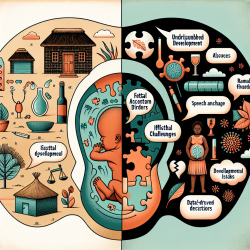In recent years, the need for effective, accessible interventions for children with Autism Spectrum Disorder (ASD) has become increasingly evident. Traditional specialist-delivered interventions, while effective, are often prohibitively expensive and not widely available, especially in low-resource settings. This is where non-specialist mediated interventions come into play, offering a cost-effective and scalable solution.
A recent systematic review and meta-analysis titled "Implementation and effectiveness of non-specialist mediated interventions for children with Autism Spectrum Disorder: A systematic review and meta-analysis" provides robust evidence supporting the clinical effectiveness of these interventions. The study, published in PLoS ONE, analyzed 33 randomized controlled trials to evaluate the outcomes of various non-specialist mediated interventions on children with ASD.
Key Findings
- Significant Improvements: The meta-analysis revealed significant improvements in several areas including communication (SMD = 0.23), expressive language (SMD = 0.47), social skills (SMD = 0.53), and parental self-efficacy (SMD = 0.42).
- Range of Outcomes: The interventions were also effective in reducing child distress (SMD = 0.55), improving motor skills (SMD = 0.25), and enhancing the parent-child relationship (SMD = 0.67).
- Cost-Effectiveness: Non-specialist interventions, such as those mediated by parents, teachers, and peers, are significantly more cost-effective compared to specialist-delivered interventions. For example, the PLAY Project Home Consultation Program costs $3,500 to $4,500 per year per child, compared to $40,000 to $80,000 for specialist-delivered treatments.
Implementation Strategies
To maximize the benefits of non-specialist mediated interventions, practitioners should consider the following strategies:
- Training and Support: Ensure that non-specialist mediators such as parents, teachers, and peers receive adequate training and ongoing support. This can include workshops, online resources, and regular supervision by trained professionals.
- Tailored Interventions: Customize interventions to meet the specific needs of each child. This can involve selecting appropriate intervention models such as Social Stories, Pivotal Response Treatment (PRT), or video modeling, based on the child's unique challenges and strengths.
- Regular Monitoring: Implement regular monitoring and evaluation to assess the effectiveness of the interventions. Use standardized tools and scales to measure progress in communication, social skills, and other targeted areas.
Encouraging Further Research
While the current evidence is promising, more research is needed to explore the long-term effects and scalability of non-specialist mediated interventions, particularly in low- and middle-income countries. Practitioners are encouraged to participate in or support research initiatives that aim to fill these gaps.
By integrating these evidence-based strategies into practice, we can significantly enhance the developmental outcomes for children with ASD and provide much-needed support to their families.
To read the original research paper, please follow this link: Implementation and effectiveness of non-specialist mediated interventions for children with Autism Spectrum Disorder: A systematic review and meta-analysis.










